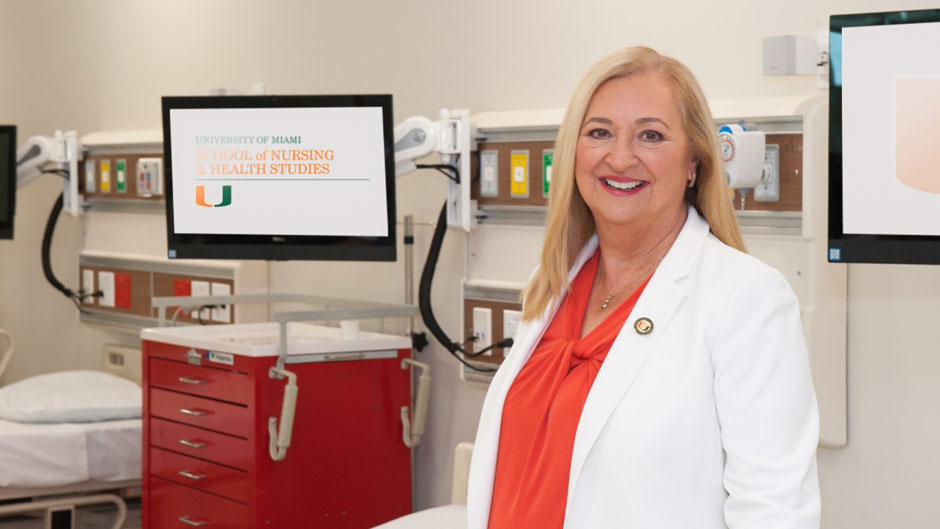At the onset of her career, Cindy Munro knew she wanted to be a nurse scientist and was thrilled when the predecessor to the National Institute of Nursing Research (NINR) awarded her a fellowship to pursue her doctoral degree in 1989.
The investment paid off: While working on her Ph.D. at Virginia Commonwealth University, Munro was part of the team that showed how oral bacteria infect heart valves, a finding that led to the first of three patents Munro holds with co-investigators. She went on to lead research that showed dental plaque was a risk for pneumonia in patients on mechanical ventilation, and led to practices that changed the oral care guidelines for intensive care patients.
Now, more than three decades later, the dean of the University of Miami School of Nursing and Health Studies is equally elated by her four-year appointment to the NINR’s National Advisory Council for Nursing Research, which NINR Director Shannon N. Zenk announced on Tuesday—when Munro remotely attended her first council meeting as a member.
“I couldn’t be more thrilled to serve on the advisory council, which is a really important voice for the NINR,” said Munro, who was inducted into the International Nurse Researcher Hall of Fame in 2016. “Their early support was instrumental in starting my research career, and I have such admiration for the work NINR does. I look forward to making a contribution to their mission in this way.”
Established in 1986 as the National Center for Nursing Research, the NINR was elevated to one of the National Institute of Health’s 27 institutes in 1993—by a federal notice signed by then-Health and Human Services Secretary Donna E. Shalala, the University’s immediate past president. Comprised of at least seven nursing experts in clinical practice, education, or research, its 15-member advisory council makes recommendations on the direction and support of NINR research that has enabled nurses to improve the health of individuals, families, and communities at all stages of life and across diverse populations and settings.
Council members also provide a second-level review of grant applications and recommend which should be approved for funding—something with which Munro, the co-editor in chief of the American Journal of Critical Care, is intimately familiar. The NINR has continuously funded her research, much of it aimed at reducing complications in ventilated ICU patients, for 20 years.
But she is particularly excited about joining the advisory council as Zenk, a nurse researcher from the University of Illinois at Chicago’s College of Nursing, begins her tenure as NINR director. The council will play a crucial role as Zenk reviews and updates the NINR’s strategic plan, an endeavor Munro said has important implications for the future of nursing and patient care that go beyond the continuing COVID-19 health crisis. Since the first case was reported in the U.S. a little more than a year ago, the novel coronavirus has infected more than 25 million U.S. residents, killing nearly 420,000.
“The work of the NIH and the NINR is much larger than COVID. It is funding the pivotal science that drives health care forward,” Munro said. “So, while some of the work will be COVID-specific, it will continue to be less about a specific disease and more about general strategies that are applicable to lots of different patient populations—including COVID patients.”
As an example, Munro noted that the NINR is the NIH’s lead institute for end-of-life and palliative care, an area of research that has and will continue to impact fatally ill COVID patients. Isolated from loved ones, they often die without any family present, only a nurse at their bedside. “A lot of the things that patients deal with at end of life—pain, trouble breathing, thirst—are very amenable to nursing research and intervention,” she said.
Due to COVID-19 restrictions, Munro and her fellow council members, who include her immediate UM predecessor, Nilda Peragallo Montano, now the dean of the School of Nursing at the University of North Carolina at Chapel Hill, will continue to meet remotely for the foreseeable future—rather than at the NIH’s Bethesda, Maryland, headquarters. But, as Munro pointed out, council meetings are partially open to the public. And watching them, even online, likely will be a transformative experience, especially for the University’s nursing students.
Munro knows this firsthand, because as a young faculty member, she used to take Virginia Commonwealth nursing students on the 90-minute trip to the meetings. But, she never imagined she would be sitting on the council one day.

